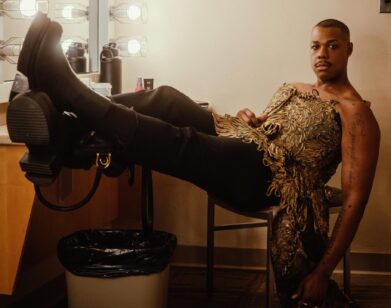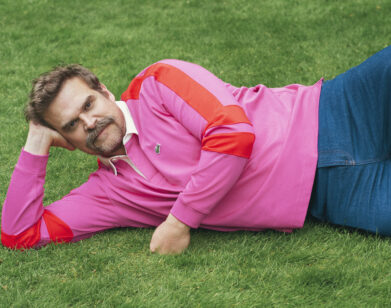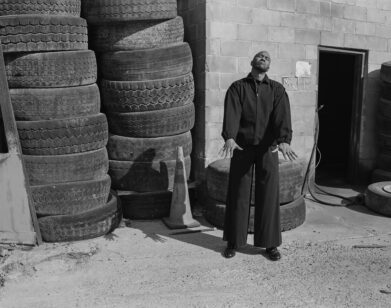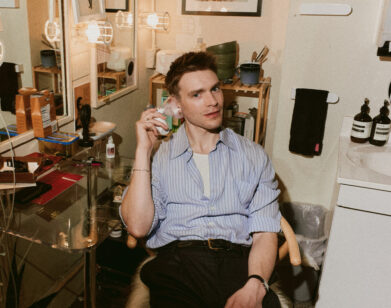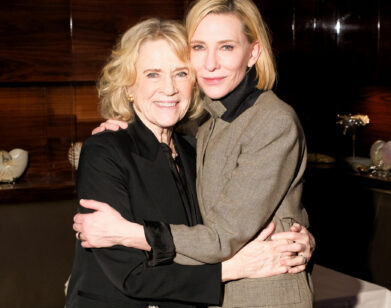ICON
June Squibb Tells Jeremy O. Harris How to Peak in Your Nineties
For the actor June Squibb, subverting the conventions of Hollywood is nothing new. “I’ve always felt that I’ve broken the rules,” she told Jeremy O. Harris last month. Having cut her teeth in the world of theater and dance, and even working alongside Ethel Merman in the 1959 Broadway production of Gypsy, Squibb wouldn’t make her silver screen debut until she was 61, in Woody Allen’s Alice. Now seven decades into an illustrious and idiosyncratic career, the Oscar-nominated actor is forcing viewers to confront their own ageism in Thelma, the Josh Margolin-directed dramedy following 93-year-old Thelma Post on her quest for justice against a con-artist who scammed her out of $10,000. Though it’s packed with wit and breakneck action, the film hits viewers hard with its themes of fragility, loneliness, and loss. To mark what is, unbelievably, her first leading role in a major motion picture, Squibb got on Zoom with Harris, a big fan of the film, to share her best bits of Broadway gossip and describe what it’s like to be hitting her prime at the age of 95.
———
JEREMY O. HARRIS: Hi, I’m so sorry. They’re filming the new Timothée Chalamet movie right below my apartment and it’s making my internet wonky. How are you doing today?
JUNE SQUIBB: Good. I’m thrilled to meet you.
HARRIS: You have no idea how excited I am to meet you. I love the movie and I’m good friends with Fred [Hechinger]. We have so many theater friends in common.
SQUIBB: Yes, I’m sure.
HARRIS: You have been on my list of people I’m most excited to interview for a very long time. I think Thelma was unlike almost anything you’ve done. But over the last decade, you’ve done some of the most idiosyncratic, dynamic performances in plays and films any actor would die to be a part of. How do you think it happened at this moment?
SQUIBB: I have no idea. I’ve always felt that I’ve broken the rules, even when I was young in New York. I think it’s what I’ve always gone into my life with. It doesn’t matter what anyone says or thinks. It’s what I’m trying to do that’s important. That’s truly what has happened to me.
HARRIS: Doing a movie like Thelma, there’s so much risk involved in all these stunts. What was it you were trying to do with this?
SQUIBB: I read that script and knew I had to do it. There was no question in my mind. And they wanted me to do it. After reading the script, you couldn’t have kept me from this film.
HARRIS: One thing I loved is it makes you check your own preconceived notions about aging and what it means to be above 50. I thought about my own grandmother and her rejection of things like, “Oh, granny can’t do this.” She’ll say, “Watch me.” What are some of the craziest things that tick you off that younger people say about your abilities?
SQUIBB: One thing that really ticks me off is when I’m there and they don’t talk to me. They talk to whoever’s around me like I’m not going to understand. I understand perfectly, and it confuses me. I feel I should be answering them, but they’re not asking me.
HARRIS: When did that start to happen?
SQUIBB: I don’t think it happened until my eighties, my middle to late eighties. It’s this thing of, they want information to get to me but they don’t think I can handle it or understand it.
HARRIS: That was one of the most palpable things about Thelma. There was a real, physical reason why information couldn’t get to her as quickly, with her hearing, but she cut through that like a knife.
SQUIBB: I think that was her whole way of getting through life, even when she was younger. After reading the script and thinking about her, I just feel that I knew this woman well.
HARRIS: Totally.
SQUIBB: I knew her as a young person. I think if you have this stamina, this determination, you’ve always had it. It’s not something that just happens when you get older. That’s why some of us do what we do.
HARRIS: A part of my own relationship to this movie is that my grandmother passed two years ago. She passed in the three-year gap between my grandpa passing. My grandpa was a very domineering man, and my grandmother was raised in the south and in the church. I saw her come alive in a different way when he left. She was always lively and funny and opinionated, but her sense of being able to take up space changed. I wonder if some of that was present in Thelma too.
SQUIBB: Josh [Margolin] understood that. He wrote that wonderful speech where I’m talking about how I’ve never been alone. That is something you wake up and find out like, “Oh my god, can I handle this or not?” Women are used to the husband having some dominance. But it’s a whole new world.
HARRIS: How much was building a biography for Thelma part of your process? You talked about how you thought about who she was as a young person. Did you build out her whole youth?
SQUIBB: No, I did not. He gave me some short films he made of her, like going to the store, riding in the car, doing different things. So I saw the actual Thelma in these little films, but I did not build a background. Bobby Lewis would hate me for saying that right now. I loved him, and I worked with him for two years, and he used to say, “June, you can’t write it, but you can do it. So what the hell?”
HARRIS: What is your process then? You have such deepness and complexity to every utterance and every twitch.
SQUIBB: I get there by knowing the script, knowing my material as well as one possibly could. Those written words are like a bible to me. And then I just let go and whatever happens, happens. That is how I work. I was trained to do that though. My second husband, Charles Kakatsakis, was an acting teacher.
HARRIS: Oh, wow.
SQUIBB: I was doing mostly musicals when I met him. We met doing a musical, in fact. He told me, “June, you could be a really good actress if you knew what you were doing.” And he was right. He was more determined this was going to happen for me than I was. I was in his class and I would scream and yell at him and everybody would laugh at us, but it worked. He made me understand how to work. So now I truly do just let go and let whatever happens, happens.
HARRIS: Speaking of young actors, I have the pleasure of being friends with Fred Hechinger. Your name comes up as one of the significant people in his life. What was it like to build that relationship with him, both as the character of your grandson but also as [art of this new generation of young actors?
SQUIBB: He’s also one of my best friends now. We met in my apartment and Josh said we were going to rehearse. We never read a scene. We just started talking and didn’t stop. There was something there, like we’d known each other for years. As we worked, it got easier and we grew closer. I just love him. When I was shooting in New York last January, we saw Fred about every week. When he’s out here, he comes and has lunch or dinner. He loves Quenches.
HARRIS: What’s Quenches?
SQUIBB: It’s a smoothie. We introduced him to those and he just loves them.
HARRIS: What were some of your favorite adventures with that cast? You get Parker Posey, you have Fred.
SQUIBB: Josh kept bringing people over for me to meet. Richard Roundtree walked in and I said, “Well, it’s about time.” Everybody looked at me like, “What are you saying?” And Richard knew immediately. We both knew we should have met and worked together years ago. We had lunch and everything. He was sexy as could be, and this voice that just sort of rolls out of him, it was wonderful. He is such a fine actor. It was my birthday and, all at once, he appeared with two dozen red roses for me.
HARRIS: Oh, goodness.
SQUIBB: I adored him. We were all just devastated at his death. We truly were. It was awful.
HARRIS: It’s horrible. But one of the things that’s so meditative and beautiful about Thelma is that conversation about the losses that happen as you age. The social losses, because people stop leaving their house, or the literal losses. Thelma has her own way of dealing with it. But how have you navigated that?
SQUIBB: I’ve always looked forward, even as a kid. I’m still thinking, “Next week, what will I be doing? What will I be offered?” I feel the losses tremendously, but I don’t dwell on them. It’s nature. It’s going to happen. If I can’t do anything about something, I don’t worry about it.
HARRIS: This idea of looking forward, it’s why you have such a boundless sense of energy. You’ve done the award circuit before. Do you enjoy it, or does it feel exhausting? It doesn’t appear to be exhausting to you at all.
SQUIBB: It’s both. By the end of today, I will be exhausted, but now I’m fine. I danced for three years in New York on stage. The body is so used to moving and to being—and to being harsh.
HARRIS: What was your favorite thing you danced in?
SQUIBB: Oh, I guess Boyfriend was probably the most fun, that 1920s stuff.
HARRIS: I don’t know about Boyfriend.
SQUIBB: Boyfriend was an English musical, which an English company with Julie Andrews brought over. It was not a great success. It played on Broadway. Then we did a whole summer tour, and then we opened Off-Broadway and it ran for about four or five years.
HARRIS: How old were you and how long did you do it?
SQUIBB: I did it in New York, then I did the summer tour, and then I did it for about a year in New York again. Then I came out here to L.A. and we did about a three-month version of it. It was all very posed and physical and 1920s dancing, but we danced our butts off.
HARRIS: One thing that excites me about being in my eighties is the chance to gossip about things I’ve held my tongue about for 30 years. What’s some great theater gossip from your youth that you’ve been dying to tell people?
SQUIBB: I think I have to go back to Ethel Merman because I did Gypsy with her on Broadway.
HARRIS: No!
SQUIBB: She was amazing. But what I loved about her is that she loved young men. She always had one on her arm.
HARRIS: I love Ethel Merman as a cougar. That’s very fun.
SQUIBB: Not many people know that.
HARRIS: So I think this is one of Magnolia’s most successful films. You’re a box office star. You’re getting all this buzz. How are you celebrating this big accomplishment? I know you just did a movie right after with Scarlett Johansson [Eleanor the Great].
SQUIBB: Yeah, I did. I’m waiting for that to open and see what happens. I loved it. We saw a rough cut and I’m thrilled with it. I think people will be amazed at her as a director, and I hope people will like me as Eleanor. I’m really waiting to see what happens with it.
HARRIS: So you’re not going to any great bars or clubs with your friends?
SQUIBB: That’s not my idea of a good time now. But at one time in my life, it would’ve been.
HARRIS: What’s your idea of a good time now?
SQUIBB: Going out to dinner with friends. I love that. We have some great restaurants in Sherman Oaks.
HARRIS: With Thelma and the Scarlett film being two huge lead roles for you, what else are you hungry to do?
SQUIBB: I keep saying a Western. I’ve never done a Western. I used to ride when I was young. I don’t know that I still could, but I could do a saloon keeper or what have you.
HARRIS: That could be really fun. I heard Ridley Scott is doing a Western.
SQUIBB: You’re kidding.
HARRIS: That’s the word on the street. We need to hit him up.
SQUIBB: Fred will probably be in that.
HARRIS: What movies do you think kids need to watch right now?
SQUIBB: Seven Samurai, that’s my favorite movie in the whole world. I love that film. I haven’t seen it in a while, but I used to see it all the time. And then also an old French movie by [François] Truffaut, The Bride Wore Black. Did you ever see that?
HARRIS: I don’t know that movie.
SQUIBB: See if you can find it. I bet you still can.
HARRIS: Are you engaging in any trash? I’ve been watching so much stuff that’s bad for my brain on Netflix.
SQUIBB: My assistant Kelly is laughing because my favorite thing in the whole world are the three FBIs on Tuesday night on CBS.
HARRIS: What are the three FBIs?
SQUIBB: You don’t know? The first one is FBI. The second one is FBI: International. And the third is FBI: Most Wanted. They’re all a little different, but I just love those shows.
HARRIS: Are they scripted or are they reality?
SQUIBB: No, they’re scripted dramas.
HARRIS: I want to write that kind of show. I don’t know that my brain can do it. I just make messes and see what sticks.
SQUIBB: I like that. That’s kind of what I do, too.


